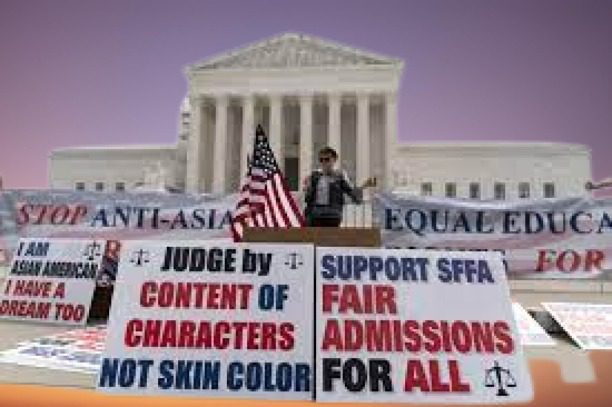Affirmative Action in College Admissions: In a landmark decision, the Supreme Court has rejected race-conscious admissions in colleges and universities. However, an interesting exception to this ruling is the exemption granted to military service academies. This exception has raised questions among dissenting justices and constitutional scholars, who argue that it undermines the majority’s argument.
The Footnote and Chief Justice John Roberts’ Explanation
Chief Justice John Roberts, in a brief footnote within the 237-page opinion, acknowledged that the court’s decision does not apply to military service academiesfor now. He cited two reasons for this exemption. First, the academies were not parties in the cases under consideration. Second, there were “potentially distinct interests” involved.
Distinct Interests of Military Academies
Although Chief Justice Roberts did not elaborate on these “distinct interests,” a friend-of-the-court brief filed by thirty-five former military leaders shed some light on the matter. These military leaders, including former Joint Chiefs of Staff chairmen, argued that affirmative action in higher education is crucial for national security.
Affirmative Action and National Security
Their argument focused on the need for diversity within the officer corpsthe graduates of military academies. They contended that the forces these officers would lead are diverse, and having a diverse leadership is essential to avoid internal resentment, discord, and violence. They emphasized that diverse units, at all levels, are more cohesive, collaborative, and effective.
Dissenting Opinion and Questions Raised
However, Justice Sonia Sotomayor, in her dissent, questioned the narrowness of the exemption granted to military academies. She also raised concerns about the lack of a similar exemption for religious institutions of higher learning, which were also not parties in the case. Sotomayor argued that if national security interests are considered “distinct,” they should apply to civilian universities as well.
Perspectives on the Exemption
Legal experts seem to support Justice Sotomayor’s concerns. They argue that many students from public colleges and private universities end up working in national security fields. They question the narrowness of the exemption and argue that if diversity promotes national security, this carveout seems insufficient to achieve that goal.
Also Read: HIV Case Found in New Mexico
Unique Characteristics of Military Academies
Military academies differ from public and private colleges and universities in that all graduating students are committed to working in national security. Their tuition, room, and board are provided for free, but in return, they must serve a minimum of five years as commissioned officers in the military.
Conclusion of Affirmative Action in College Admissions
Despite these unique characteristics of military academies, some experts believe that the exemption for these institutions undermines the majority’s argument. While acknowledging the federal government’s unique responsibilities, they point out that the concerns of universities in creating diversity are similar. The exemption appears to be inconsistent and raises questions about its necessity.
Our Reader’s Queries
What is affirmative action in college admissions against?
In June, the court made a 6-3 decision to ban the use of race in college admissions nationwide. California’s public universities have not used affirmative action for nearly 30 years. However, selective private colleges in the state, as well as many out-of-state public universities, have historically relied on this practice.
Does Harvard use affirmative action in admissions?
Harvard College revamped its application process following a Supreme Court decision in June deeming its affirmative action in admissions unconstitutional.
What are the cons of affirmative action in colleges?
Opponents of affirmative action argue that it lowers their chances of success. They claim that it hinders students of color from reaching their potential by creating a lack of motivation to excel academically. If a 3.2 GPA is all that is required for admission, it can be perceived as pointless to aim for a 4.0 GPA.
When did affirmative action start in college admissions?
Affirmative action policies based on race have been in place in higher education since the 1960s. These policies have faced constant criticism for their legality and fairness for over 20 years. Supporters and opponents have engaged in numerous debates on the topic.

